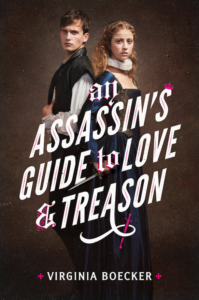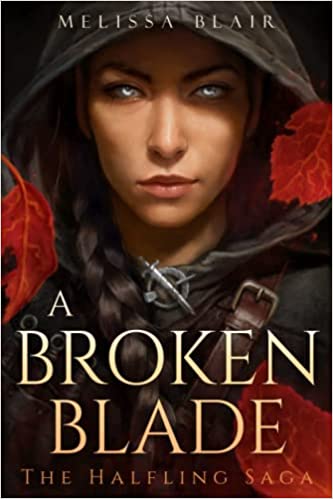

An Assassin’s Guide to Love and Treason
Author: Virginia Boecker
Pub. Date: October 23, 2018
Publisher: Little, Brown Books for Young Readers
Formats: Hardcover, eBook
Pages: 384
Find it: Goodreads, Amazon, B&N, iBooks, TBD
Synopsis: When Lady Katherine’s father is killed for being an illegally practicing Catholic, she discovers treason wasn’t the only secret he’s been hiding: he was also involved in a murder plot against the reigning Queen Elizabeth I. With nothing left to lose, Katherine disguises herself as a boy and travels to London to fulfill her father’s mission, and to take it one step further–kill the queen herself.
Katherine’s opportunity comes in the form of William Shakespeare’s newest play, which is to be performed in front of Her Majesty. But what she doesn’t know is that the play is not just a play–it’s a plot to root out insurrectionists and destroy the rebellion once and for all.
The mastermind behind this ruse is Toby Ellis, a young spy for the queen with secrets of his own. When Toby and Katherine are cast opposite each other as the play’s leads, they find themselves inexplicably drawn to one another. But the closer they grow, the more precarious their positions become. And soon they learn that star-crossed love, mistaken identity, and betrayal are far more dangerous off the stage than on.
*EXCERPT*
Chapter 1
Katherine
St Mawgan in Pydar, Cornwall
28 October 1601
A sound, sudden and echoing, wakes me from sleep.
At first I think it’s a dream, as I am often woken by nothing and for nothing: jolted awake believing someone is beside me or above me but no one ever is, their absence never a relief so much as a reprieve. But no, there is the sound again, someone hammering on the front door, insistent. A quick glance out the window tells me it’s sometime in the middle of the night. I could be asking myself who is it, what do they want, can’t they come back in the morning, but I don’t because I already know the answer to all of it.
I know.
I am out of my bed at once, snatching up my dressing gown and then my coat, because the fire has died in my fireplace and it is so chilled in my chamber I can see my breath. I rush to the window, swipe the frost from the pane before sucking that cold breath right back in. Flickering flames bob across the night sky like fireflies, not the warm glow of candles but the aggressive heat of torches held high. They stretch past the gates that surround Lanherne, my home— belonging to my father and his father and his father before that, the seat of the Arundell family— into the marshy moors of Cornwall, as endless as the Celtic Sea.
We are surrounded.
Every sense I have tells me to run and hide. In this house, with its three floors and thirty-four rooms, there is no shortage of places I could tuck into and wait until this is all over. But that is not the plan. We have been over this, Father and I, what to do if this happened, if they finally discovered who we were and what we were doing. If and when they finally came for us.
My father— Sir Richard Arundell, receiver general of the Duchy of Cornwall— is to remain in his chamber, as if he is unaware of what is happening, as if it is wholly unexpected. Ryol— Father’s manservant who is not really a servant at all, but a priest— is to gather his vestments, vessels, altar furniture, and other incriminating items and slip into his hiding place, a small chamber accessed through a panel beside the chimney in the drawing room. Peran, Father’s valet, is to answer the door, alongside at least one but not more than two maids in attendance. Enough to give ceremony but not enough to show fear.
I am to slip back between my sheets and wait. When the accusations come— and they will come— I am to appear at the top of the stairs, wide-eyed and tousle-headed, as if I could not be more surprised by their appearance, as if I have not been waiting for it nearly all my seventeen years. I am to inquire in a tiny, little-girl voice, Is there something the matter, sirs? This is to remind them that my father is a family man, that he has a daughter and once had a wife, that he is a nobleman and I am a lady. To make them forget what we really are:
Liars, criminals, heretics, and traitors.
I creep to my chamber door, finger the cold brass knob, and pull it open. From here I have a full view of the hallway and the staircase that winds below, all the way to the dark, empty entry and the front door that still groans under assault. I should turn from it, crawl back under my now-cold bedcovers and feign sleep, though it would be an impossibility. Instead, I close my eyes and begin to count backward from five in Cornish. It’s a trick Father taught me as a way to manage my fear, a way for me to give in to it and let it have its way with me, but only for five seconds. After that, I had to let it go.
I’ve reached dew— two— when I hear the sharp tap of footsteps, hard soles on a lacquered floor. One servant’s shaky light follows another as candles are lit and move down the hall toward the door, more rapidly than they should do, I think. A whisper of skirts, the clucking of worried tones in Cornish, then Father’s reassuring voice replying, “Ny da lowr,” which means “It will be all right.” That is one— no, two— deviations from the plan I have known as long as I was old enough to know it, one I could recite as faithfully as if it were a catechism. From his place in the hall below, Father turns his head up to me, as if he somehow knew that’s where I’d be.
“Back to bed, Kerensa,” he says. His endearment— the word means “love”— was his childhood nickname for me and is meant to soothe, but it doesn’t.
“Father—”
“Ny da lowr,” he repeats. “I promise.”
I nod but I don’t obey, tucking myself into the shadows so as not to be seen. There’s a hesitation, a deep indrawn breath, then Father turns back to the door, opening it to the sea of faces on the other side.
“John.” He nods to the man in front of them all: Sir Jonathan Trelawney, the sheriff of Cornwall. I’ve seen him before, of course; he is a friend of Father’s and a regular visitor, though usually in daytime hours. “It’s a bit late for a game of one and thirty, is it not?” He peers over Sir Jonathan’s shoulder. “At any rate, you’ve brought too many men. It’s a game for six, not sixty.”
Father tries for levity, but his voice is as pinched as his face and for a moment, I see him. Not the quiet, devout man who raised me as gently as he could, despite my arrival heralding the death of my mother and the loss of another chance at the male heir he so desperately needed, but as others might. Black velvet breeches, black cloak trimmed with sable, flat black cap pulled resolutely over red hair, the same shade as mine. The most important man in the county. Only now he does not look hard, the way he does when he rides through the duchy collecting taxes or visiting tenants or doling out payment to the soldiers he maintains on behalf of the queen. He looks the way I do when I catch a reflection of myself unawares, when I forget to school my features otherwise.
He looks afraid.
“Would that I were here for games,” Sir Jonathan replies. “But unfortunately it’s for something far more disagreeable.” He passes off his torch to one of many waiting pairs of hands and steps uninvited into the parlor. He does not take off his cape and the servants don’t offer to take it. They have already scattered like mice, vanishing into the shadows— deviation number three.
“It’s late, John.” Father tries again. “Not even I do business at this hour. Not unless I’m in the cups and it is far past that hour as well. Perhaps tomorrow—” He tries to usher Sir Jonathan back out the door, but the sheriff is unyielding.
“I am here to arrest you for countable crimes committed under the Act Against Recusants,” he says. “Refusal to adhere to common prayers, sacraments, rites, and ceremonies of the Church of England. Refusal to swear allegiance to Her Majesty the Queen as the supreme governor of the Church of England. Possessing materials banned within the Commonwealth of England. Harboring a man known or suspected to be an agent of the bishop of Rome.”
I don’t move, but I am not still: Every part of me shakes. It is true, what he says, every last word. But to hear it out loud, the accusation, is to understand the severity of our crime all over again.
Father explained it to me like this: Our Protestant Queen Elizabeth feared that the pope wanted to reclaim religious authority over England, the way he had before the queen’s own father took it away. The queen was afraid that in order to get it back, the pope would unite Catholic Italy with England’s Catholic enemies France and Spain, that they would form an alliance and, with help from England’s prominent Catholic families, plot to overthrow her, put a Catholic on the throne, and restore Catholicism to England. She feared this so much she made all of us swear an oath stating our allegiance to her, her authority, her religion. Any family refusing to attend her Protestant services is suspect. Any family holding secret Catholic Mass is suspect. Any family harboring Catholic priests is suspect.
It is more than suspect: It is treason.
But Father does not admit guilt so easily. “You have no cause for this.” He waves the sheriff’s words away as if they were moths. “I do not wish to cause strife, John, but I answer to a higher power than yours, and that is Her Majesty’s. And unless her word has ordered you to my doorstep, I’m afraid I’m going to have to bid you a good evening.” Again, he tries to prod Trelawney out the door. But Trelawney reaches into his doublet to produce a scroll of parchment, rolled and sealed with a royal badge along the bottom that even from my place in the shadows I recognize.
ER.
Elizabeth Regina.
Elizabeth the queen.
This is my last chance to do something, to act; it is my last chance to play my part though everything else is uncertain. I throw off my coat, which I wouldn’t be wearing if I just climbed out of bed, tighten the ties of my dressing gown. Then I step into a puddle of moonlight that falls through the windowpanes and onto the dark floors of the hallway. I pretend I am standing in the choir stalls the way I do every Sunday, attending Protestant services to keep up appearances, readying myself to sing before the congregation. This helps to calm me.
“What’s happening?” This line is new, and not part of any plan, but I can hardly ask if there’s something the matter since clearly something is and it has already come to confrontation.
“Katherine.” Father turns his head to look at me, as do Sir Jonathan and the row of red torchlit faces in the doorway. “Go back to your chambers. This doesn’t concern you.”
But Sir Jonathan doesn’t agree. He snaps his fingers and two men from the front line burst through the door and clamber up the stairs, making their way to me. I know that to run would be to admit guilt, so I
allow them to take my arms and pull me down the stairs and up before the sheriff. He looks at me and I look right back.
“Katherine Arundell,” he says. “How do you respond to the charges leveled at your father and his household? That of recusancy, and of unlawful adherence to the Catholic faith?”
“Catholic faith, sir?” I reply. “I’m not sure what you mean. I just saw you last week at St. Eval, if you recall. The Evensong service? My favorite hymn was ‘Awake, My Soul.’ I especially liked how the chorister had us stretch awake into three syllables. A‑a‑wake my soul . . .”
Well, I am a fool now but it seems to work, at least a little. I have a beautiful voice and I know it, and it seems the men gripping my arm do, too, as they’ve let me go and are looking at me with soft little smiles. I stop singing and fold my hands together, as if I’m so overcome by the spirituality of it all I simply cannot continue. But Sir John’s sympathy is as scant as his tithing envelope and with a scowl he says, “Your father has not been to Anglican services in over a year.”
“Only because he is a very busy man,” I say piously. “His duties for the queen cause him to be gone for so long—”
“You have not answered the question,” he says. “So I’ll ask you more plainly. Are you, or are you not, a Catholic?”
I know the answer to this question. It was written for me by Father, and easy enough to remember if impossible in elocution. It is to deny everything I know: my father, my upbringing, my whole life. But it seems my silence is reply enough.
Sir Jonathan turns to his men. “Search the house.”
Before I can utter a single sound of protest, the door is battered open on its hinges, the hall filled with the rain of boots and the voices of two dozen men thundering for justice. Father tries to stop them— tries— he pulls his sword to block them, but then Sir Jonathan takes his out, too. They begin parrying as the rest of the men swarm through the house.
They tear down the hallway, up the stairs, into room after room. All of them armed: some with swords and knives, some with fire, others with sticks and rocks. Wall hangings ripped from their moors, the shred of knife after knife into chair after chair, tugging out feathers and jamming in hands. Floors are eviscerated, rugs torn aside, wood boards pried open. The servants, silent before, scream and wail and rush around in a frenzy of protest and fear and aborted escape.
I don’t know what to do. Ryol is still in hiding, Father is still fighting, and everyone else is still running and shouting. The thought of being handled by more of Trelawney’s men finally compels me to move and so I do, hiding behind a massive cabinet pressed into a corner beneath the staircase. I used to hide here as a child and the space was small even then. Now I barely fit.
I’m tucked into a ball, not moving and scarcely breathing, watching Father and Sir Jonathan. What started out as posturing has escalated into an ugly battle, blades rising and falling and clashing and coming far too close to hearts and guts and throats; an inch or two from becoming a fatal blow. I can’t tell who is winning, if anyone is, but when I hear a shout and a laugh and the words I’ve got him, I know
that we have lost. Father turns to see them coming and in that brief moment of distraction, Trelawney has him: His blade pressed to Father’s chest and there is no move left for Father to make.
Two men rush into the hall holding Ryol in an unforgiving grip; another holds his missal; still another holds a chalice and another a paten, all sacred items used during Mass, but they wave them over their heads as if they were a banner of victory. Trelawney scans them all with heartless eyes as Father stifles a groan and slumps against the wall, shoulders rising rapidly in time with his breathing. He looks as sick as I feel.
“Is he your man, Richard?” Sir Jonathan’s treacherous gleam falters. Maybe he’s thinking about the break on rent Father once gave him; maybe he’s recalling the many nights they spent playing cards. Maybe he is thinking about how he saw me at Anglican services, dressed in my Sunday best. Whatever he is thinking, he has got the cat by its tail and he is considering, if only for a moment, whether to let it go. “If you were unaware that he was a priest, bringing treason to your home, now is your chance to claim it.”
Father says nothing.
“They’ll hang you for it, Richard.” Trelawney speaks the words I can barely think. “You’ll lose your lands, your title. You’ll be executed as a traitor.”
Father looks to Trelawney. A moment, two; a lifetime passes before he says, “He is my man. He is my priest, and this is my belief. I have renounced them for long enough, and I will do so no longer.”
Sir Jonathan snaps his fingers. One of his men steps forward, snatching Father’s arm. Father stumbles forward with another muffled grunt, his sword clattering to the floor. There’s a moment of confusion, a man shouts “Ho!” and Father’s palm, pressed to his chest, now comes away red. Below him, puddled under his boots, a growing ring of blood.
Now I see why Father didn’t renounce his faith, why he gave in so easily. Trelawney’s sword had landed a blow, one Father didn’t deflect and knew he couldn’t recover from. I am on my knees behind the cabinet now, as if I could pray away what I know will come next.
About the Author
 Virginia Boecker recently spent four years in London obsessing over English medieval history, which formed the basis of The Witch Hunter. She now lives in Portland, Oregon with her husband and spends her days writing, reading, running, and chasing around her two children, a cat named Thomas and a dog named George.
Virginia Boecker recently spent four years in London obsessing over English medieval history, which formed the basis of The Witch Hunter. She now lives in Portland, Oregon with her husband and spends her days writing, reading, running, and chasing around her two children, a cat named Thomas and a dog named George.
In addition to English kings, nine-day queens, and Protestant princesses, her other obsessions include The Smiths, art museums, champagne, and Chapstick. She is represented by John Cusick at Folio Literary Management.
Website | Twitter | Facebook | Pinterest| Instagram | Goodreads
Review of An Assassin’s Guide to Love and Treason
Review (4.5 Stars): I love historical fiction and An Assassin’s Guide to Love and Treason is the perfect book that you could get lost in. I loved the espionage and intrigue as well as the romance between Toby and Katherine. This story will keep you on the edge of your seat as Katherine tries to get revenge against the Queen for helping to kill her father and I can’t wait to read this book again soon.





Bekah
This book sounds so good plus look at that cover!! *heart eyes*